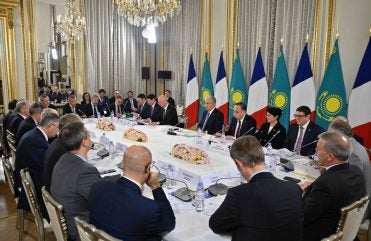
Kazakh President Kassym-Jomart Tokayev held bilateral talks with French President Emmanuel Macron during a state visit to Paris, which also coincided with the 13th meeting of the Kazakh-French Business Council.
After the bilateral talks, Tokayev and Macron issued a joint statement, which noted: “This visit is significant for us. France is a close and reliable partner of Kazakhstan in the European Union. For 34 years, our relations have acquired a strategic character. Astana and Paris have established a political dialog based on mutual understanding at all levels.”
It added: “Ties in trade and economic, investment, cultural, and humanitarian spheres have been strengthened; a clear legal framework has been formed. Interaction within the framework of international organisations has expanded.”
Tokayev said trade turnover last year between the two countries amounted to $4.2bn “and this year, we reached this figure in nine months”. He added: “France ranks sixth in terms of investment in our country. French companies, including Alstom, Total Energies, Air Liquide, Orano, Vicat, Danone, and Lactalis, have invested heavily in Kazakhstan, reaching about $19.5bn. Cooperation in the oil and gas, mining, industrial, construction, aviation, engineering, and health care sectors is being strengthened.”
Tokayev also met with Luc Rémont, CEO of Electricité de France (EDF). He noted that EDF is on Kazakhstan’s shortlist of potential nuclear technology suppliers for its planned nuclear power plant. He also referred to the possibility of forming an international consortium to support the project. Rémont expressed EDF’s commitment to continuing its partnership with Kazatomprom, Kazakhstan’s national atomic company, and shared ideas for renewable energy initiatives.
In a meeting with Orano President Nicolas Maes, Tokayev discussed cooperation opportunities in uranium supply and high-tech industries. He emphasised the importance of the Kazakhstan-France partnership in securing reliable, safe uranium supplies to France while expanding Kazakhstan’s high-tech industrial capabilities. They also explored collaboration in scientific research and rare metal mining.
During a meeting with shipping company CMA CGM President Rodolphe Saadé, Tokayev highlighted Kazakhstan’s role as a critical transit hub for East-West and North-South routes, expressing interest in expanding logistics infrastructure and attracting investment to enhance cargo capacity through Kazakhstan. They discussed potential collaboration on the Trans-Caspian International Transport Route (TITR), also known as the Middle Corridor, and investments in Aktau seaport’s logistics infrastructure.
Tokayev also participated in an investment roundtable attended by the heads of France’s largest companies. “We are pleased to be one of France’s main trade, economic, and investment partners in Central Asia. Kazakhstan now accounts for more than 80% of France’s trade with the region. This year, bilateral trade volume has increased by 45%,” Tokayev said.
The President also outlined promising areas of economic ties. “Energy has always been a key sector of our cooperation. Astana is a major supplier of oil and uranium to the European Union and is ready to support France’s energy sovereignty further. We expect an intensified presence of French industry in Kazakhstan, with which we associate the introduction of advanced technologies in our production sphere. Given that our country is the largest uranium producer in the world, and France has extensive experience in the nuclear industry, we could cooperate in civilian nuclear energy,” Tokayev stated.
French and Kazakh officials signed 12 interdepartmental agreements and 12 commercial contracts valued at $2.2bn at the 13th meeting of the Kazakh-French Business Council.
Gabidulla Ospankulov, the Chairman of the Investment Committee of the Kazakh Foreign Ministry, noted that the list of joint initiatives includes 31 projects worth $4.4bn to date in such sectors as industry, mechanical engineering, petrochemicals, agriculture, medicine, and pharmaceuticals. Ospankulov highlighted the prospects for cooperation with French companies in nuclear energy such as Orano and Électricité de France (EDF. He said that Orano brings extensive experience and technology in uranium extraction, which Kazakhstan aims to use for its uranium mining industry. Ospankulov said that a decision on forming a consortium with these companies was possible following negotiations.
On the eve of his visit to Paris, Tokayev published an article for the French newspaper Le Figaro, in which he explained the country’s position on global challenges and prospects for cooperation with France and the EU. “During President Macron’s visit to Astana last November, our countries expressed mutual interest in developing cooperation in the areas of rare earth metals, renewable energy and civil nuclear energy, which opens up new prospects for expanding our strategic partnership,” said Tokayev in the article.
“The positive outcome of the recent national referendum on the construction of the first nuclear power plant in independent Kazakhstan lays a solid foundation for mutually beneficial cooperation in the future. Undoubtedly, it will also contribute to strengthening global energy security,” he added.
Tokayev cautioned that the world is becoming increasingly unpredictable and polarised. “The situation is complicated by two major planetary challenges: rapidly increasing climatic warming and mass migration. These factors, mutually reinforcing each other, are leading to devastating consequences that are affecting millions of people around the world,” he said.
“One of the key aspects of the new reality is the recognition of the growing role of the group of middle powers. The economic and political importance of these countries is growing, and their balanced and constructive stance is becoming an advantage in the face of global uncertainty. With the major powers unable to reach consensus, it is the middle powers that are increasingly assuming the role of mediators, maintaining opportunities for dialogue and a commitment to global cooperation,” he noted. “The new status of a middle power indeed imposes a great responsibility on our country to carry out this important mission,” he added.
“We look forward to working with France, which enjoys unquestionable prestige in the international arena and has extensive diplomatic experience. Together, we can do our part to build a stable and prosperous world, guaranteeing secure coexistence, mutually beneficial cooperation and progress for all.”






